
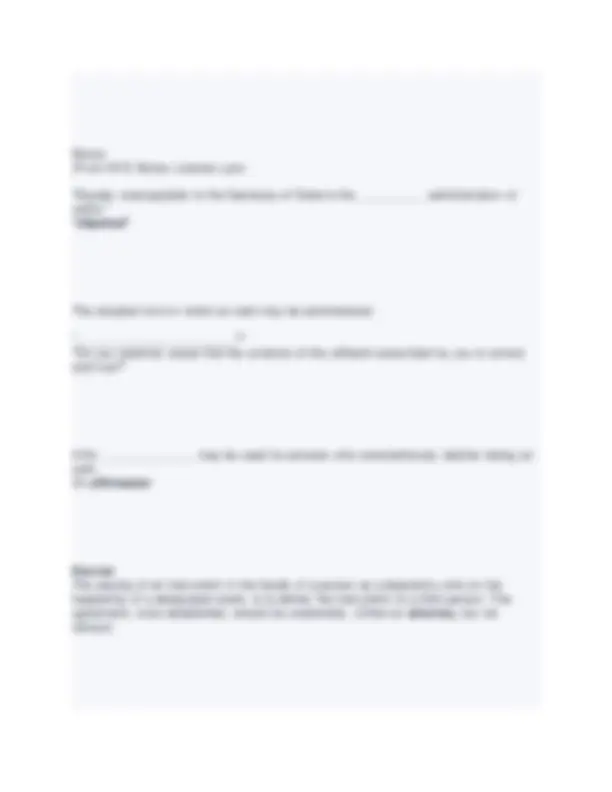
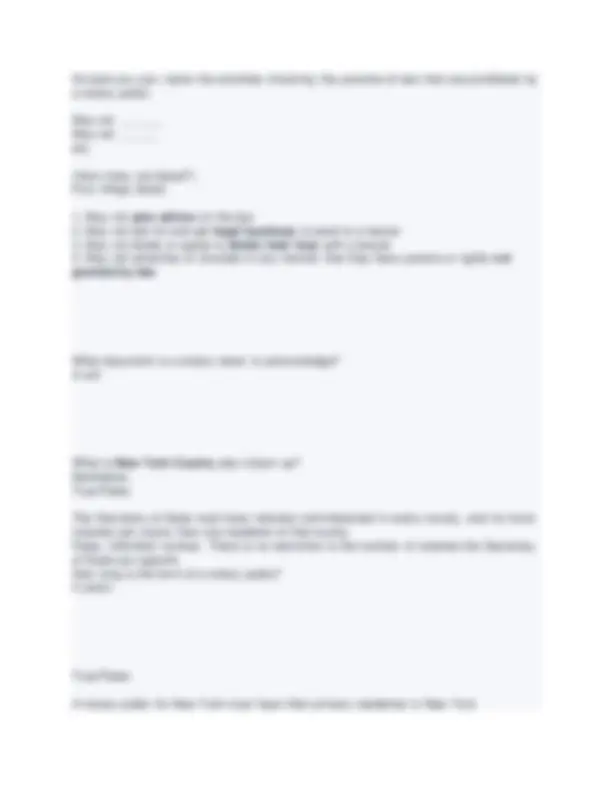
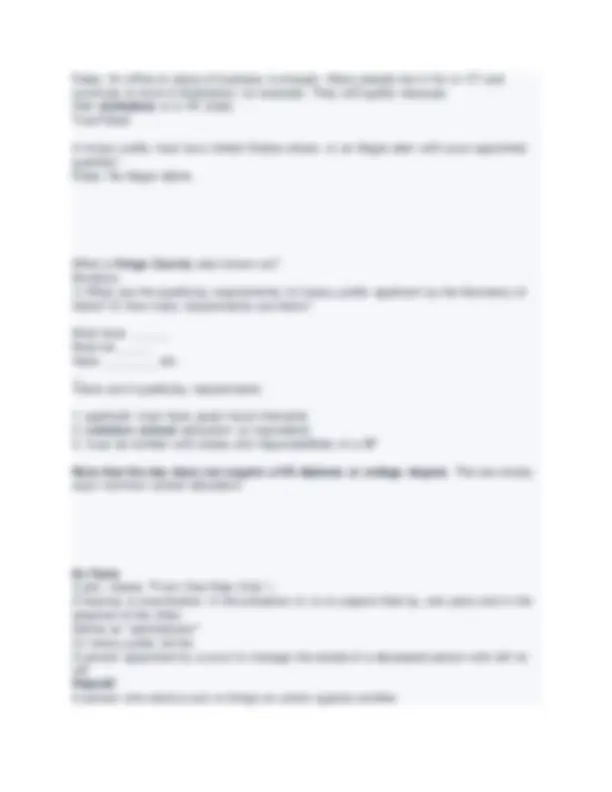
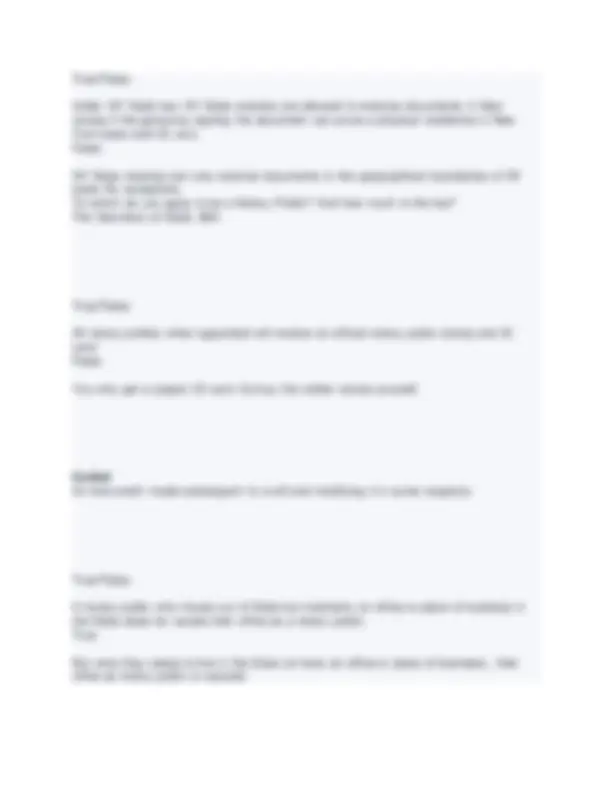
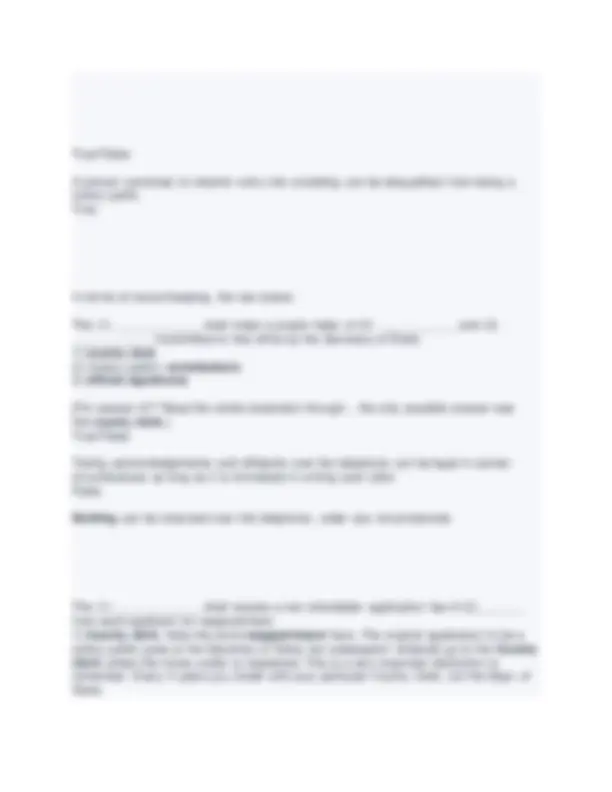
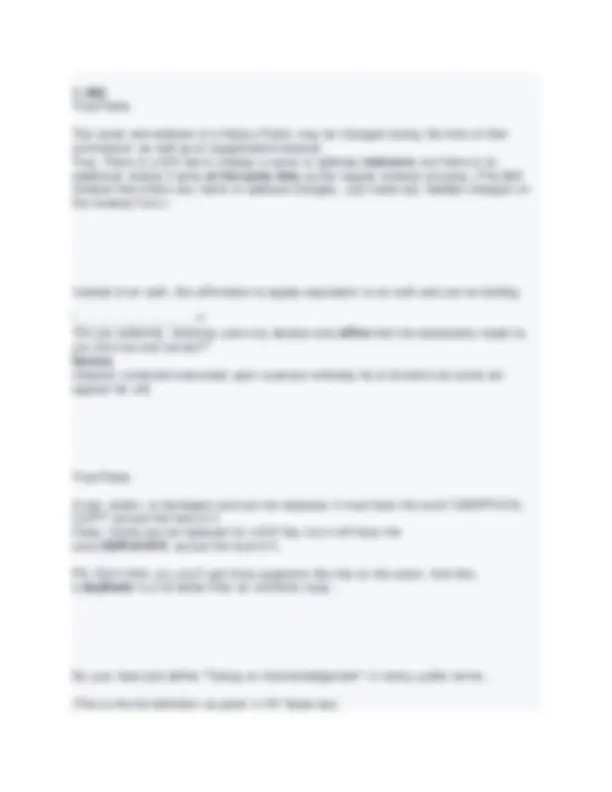
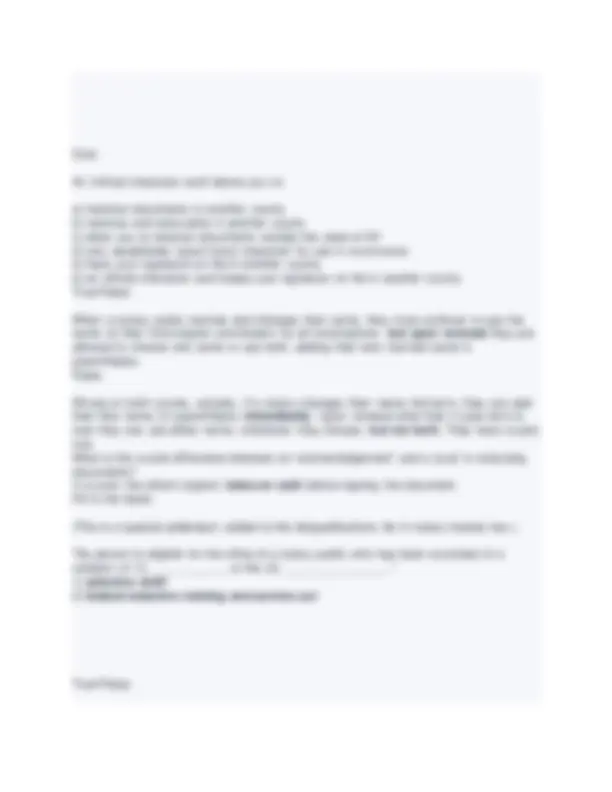
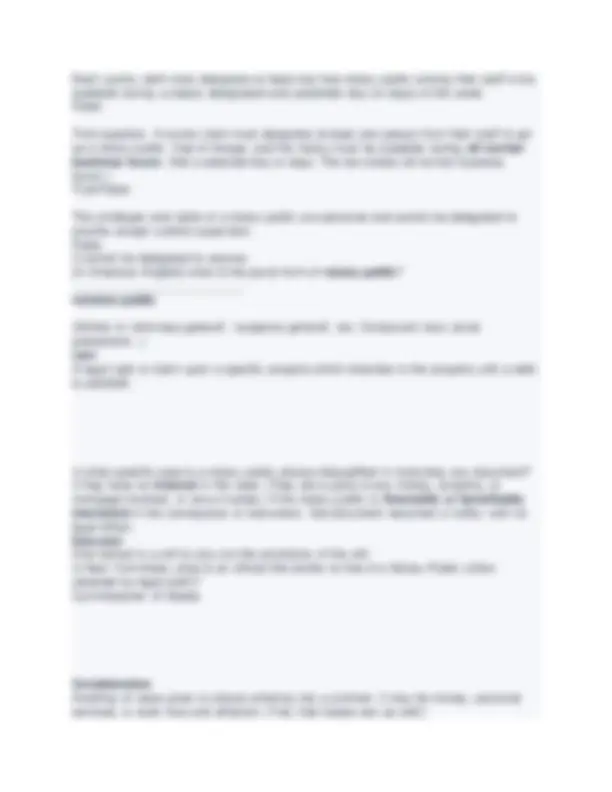
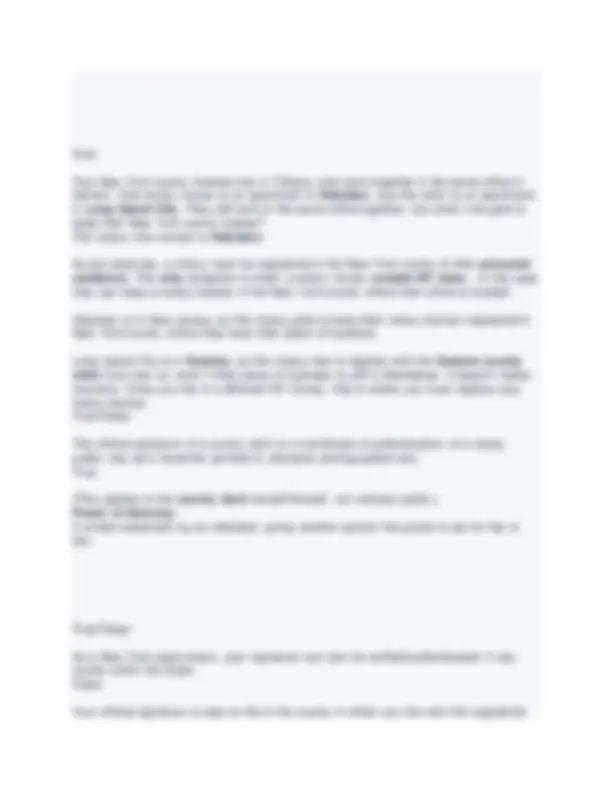
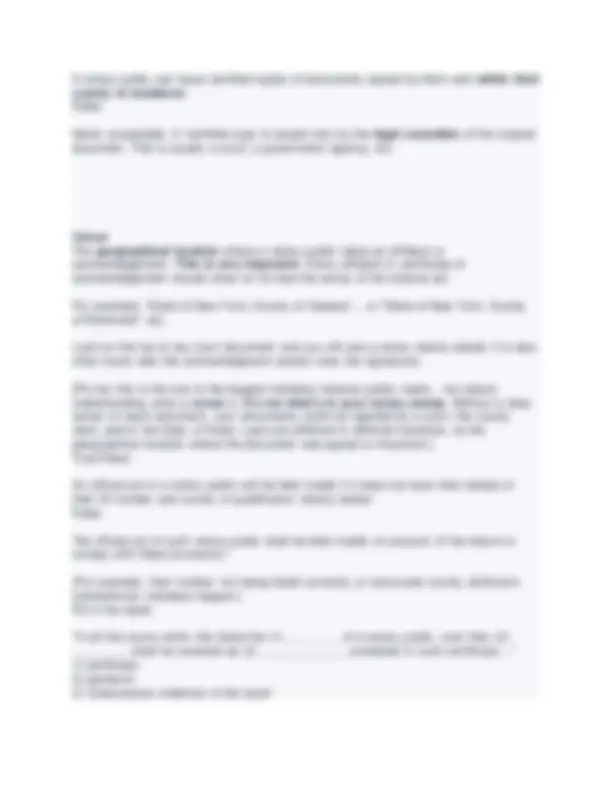
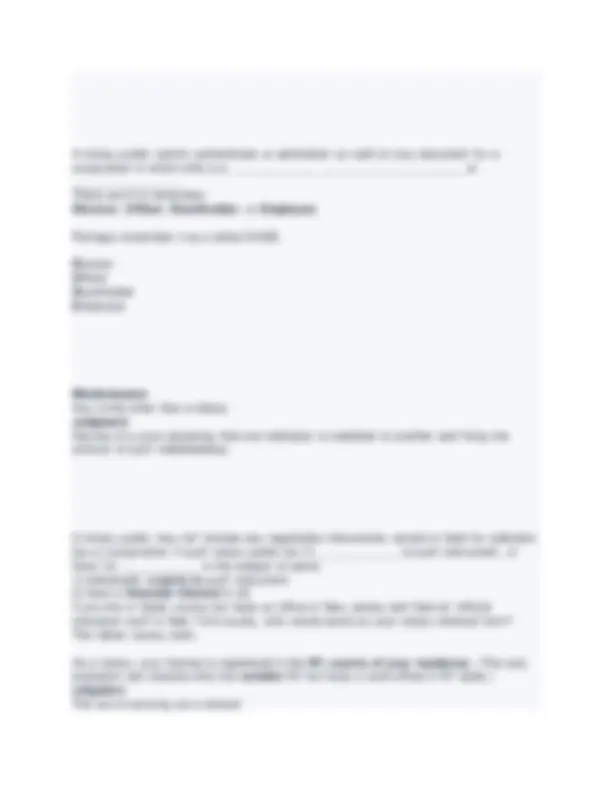
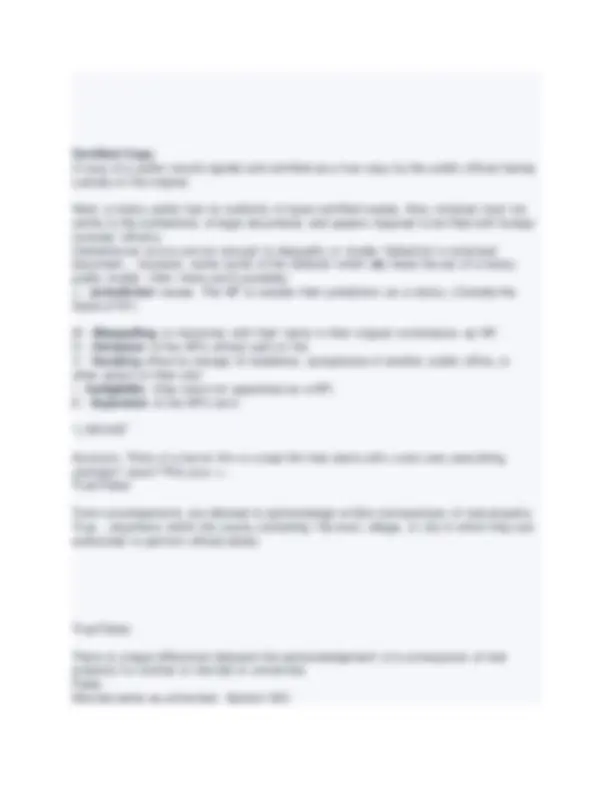
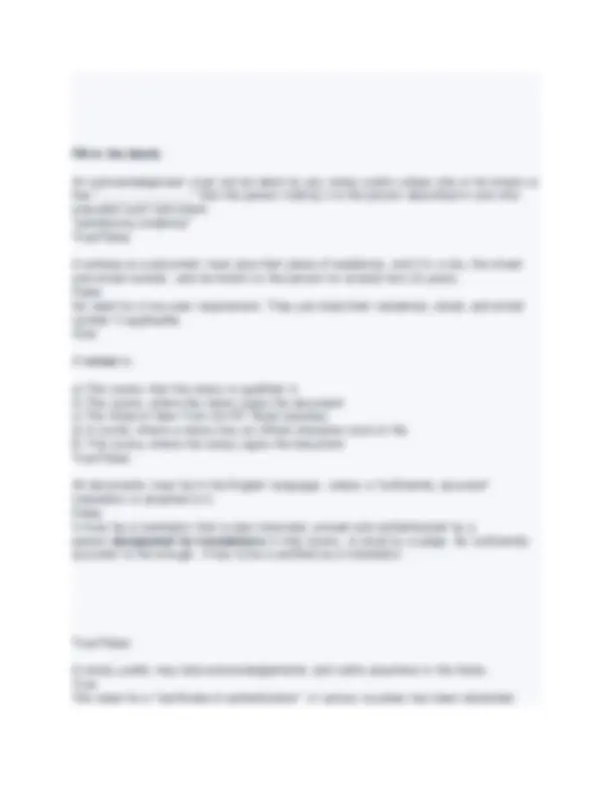
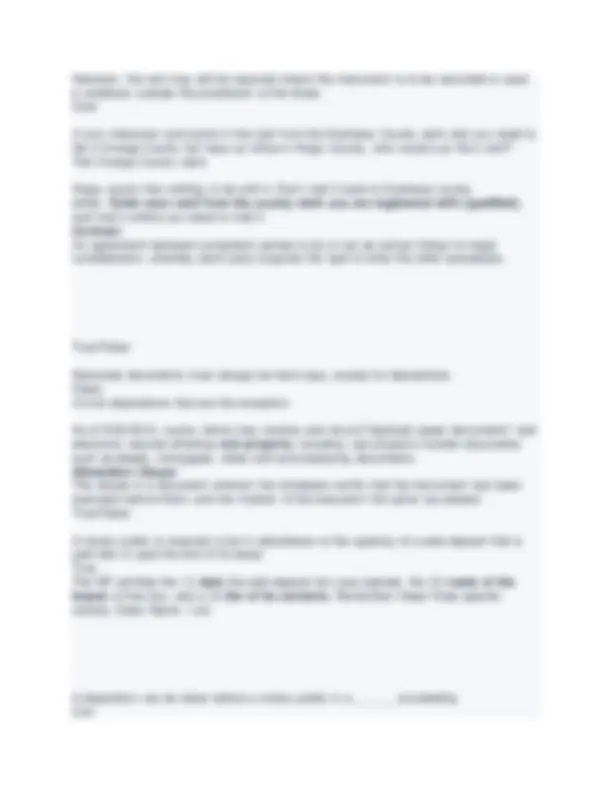

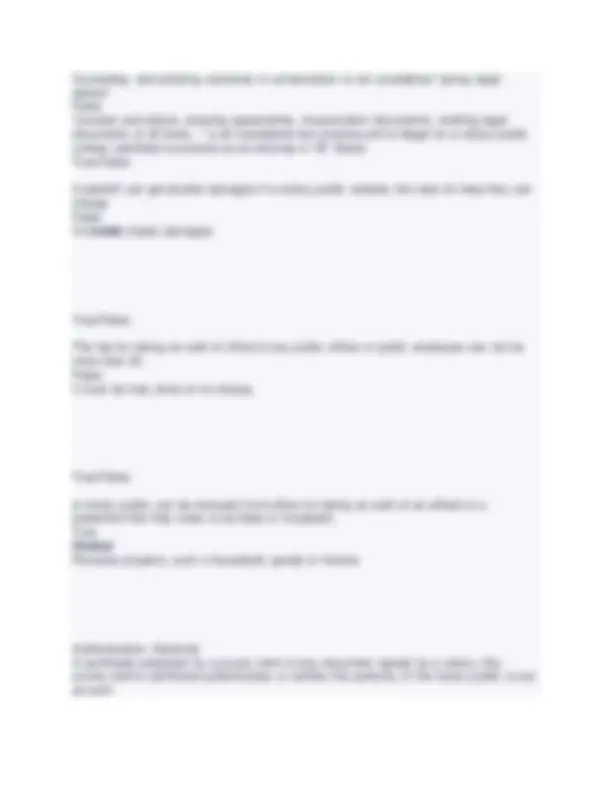
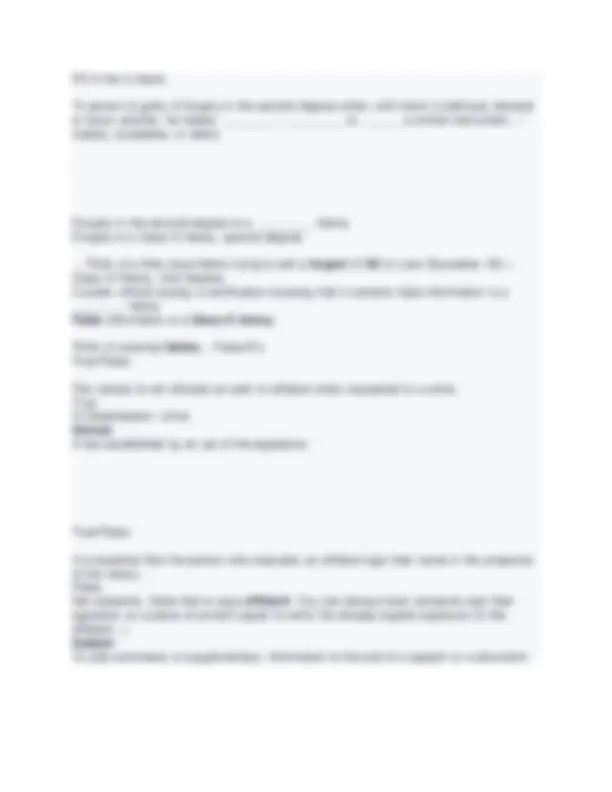

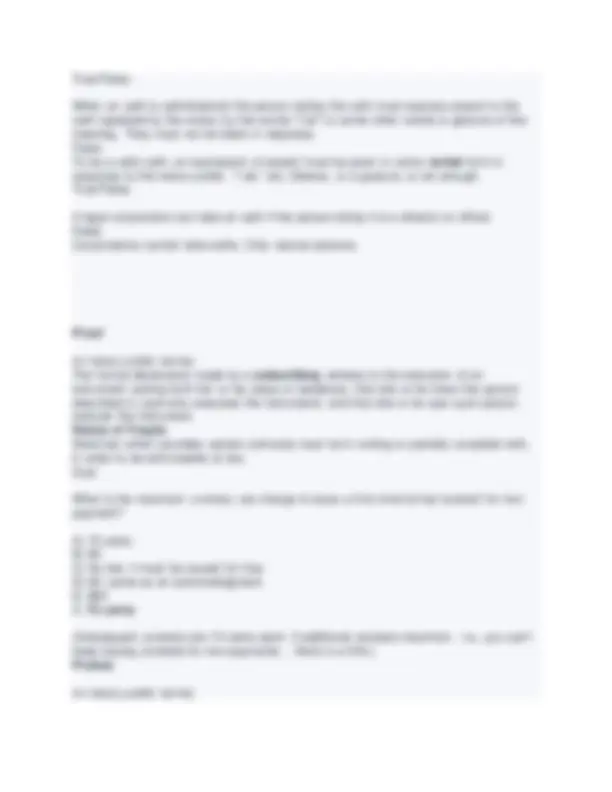
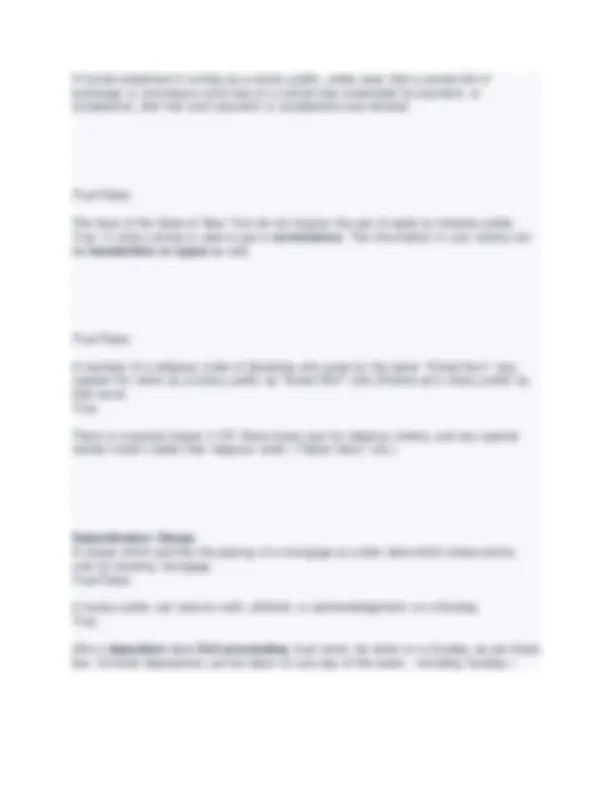
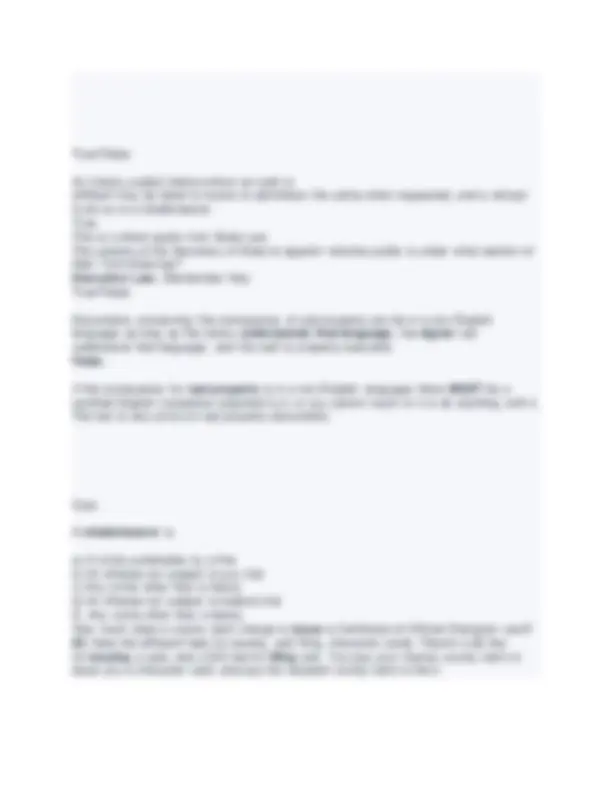

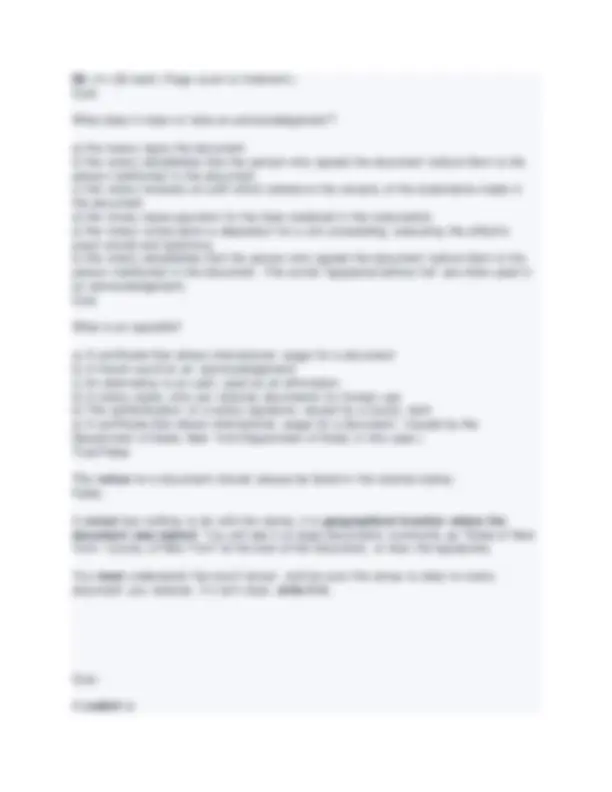



Study with the several resources on Docsity

Earn points by helping other students or get them with a premium plan


Prepare for your exams
Study with the several resources on Docsity

Earn points to download
Earn points by helping other students or get them with a premium plan
Community
Ask the community for help and clear up your study doubts
Discover the best universities in your country according to Docsity users
Free resources
Download our free guides on studying techniques, anxiety management strategies, and thesis advice from Docsity tutors
A comprehensive study guide for the new york state notary public license exam. It covers key concepts, definitions, and practice questions with solutions, helping aspiring notaries prepare for the exam. The guide includes topics such as the role of a notary, legal requirements, prohibited activities, and record-keeping procedures.
Typology: Exams
1 / 32

This page cannot be seen from the preview
Don't miss anything!

























Notaries public are commissioned by _____________ The Secretary of State
A/An _________ may be appointed a notary public without an examination an attorney admitted to practice in New York State (bonus point: also exempt are officially appointed Court Clerks in the NY State court system)
True/False:
Non-residents of New York state who have offices or places of business in the state may also become notaries. True.
An office or place of business is sufficient.
Notary Public
(The full definition, as laid out in NY state law.) A public officer who executes acknowledgements of deeds or writings in order to render them available as evidence of the facts therein contained; administers oaths and affirmation as to the truth of statements contained in papers or documents requiring the administration of an oath.
Laches
The delay or negligence in asserting one's legal rights.
The (1)_________ and (2)__________ of the notary must be filed in the office of the county clerk of the county where the notary is located, or has office or place of business
"Use of the office of notary in other than the ___________ procedure required is viewed as a serious offense." "specific, step-by-step"
True/False:
A notary public is allowed to administer an oath to herself or himself under certain circumstances (by a requesting judge in a civil trial, or at the request of the Secretary of State) False.
A notary public can never administer an oath to themselves. True/False:
A jurat is not the affidavit. True.
The jurat is the specific part of the document where the notary public certifies that the document was sworn to before her or him in person. The key words here are: sworn and in person. Guardian A person in charge of a minor's person or property.
As best you can, name the activities (involving the practice of law) that are prohibited by a notary public.
May not _______ May not ______ etc.
(How many are listed?) Four things listed:
What document is a notary never to acknowledge? A will
What is New York County also known as? Manhattan. True/False:
The Secretary of State must have notaries commissioned in every county, and no more notaries per county than are residents of that county. False. Unlimited number. There is no restriction to the number of notaries the Secretary of State can appoint. How long is the term of a notary public? 4 years
True/False:
A notary public for New York must have their primary residence in New York
False. An office or place of business is enough. Many people live in NJ or CT and commute to work in Manhattan, for example. They still qualify because their workplace is in NY state. True/False:
A notary public must be a United States citizen, or an illegal alien with court appointed guardian. False. No illegal aliens.
What is Kings County also known as? Brooklyn.
Must have ______ Must be _____ Have ________ etc ... There are 3 qualifying requirements.
1: applicant must have good moral character 2: common school education (or equivalent)
Note that the law does not require a HS diploma or college degree. The law simply says 'common school education'.
Ex Parte (Latin, means "From One Side Only".) A hearing or examination in the presence of, or on papers filed by, one party and in the absence of the other. Define an "administator" (in notary public terms) A person appointed by a court to manage the estate of a deceased person who left no will Plaintiff A person who starts a suit or brings an action against another.
An attorney who is a notary public who moves out of NY State, but who keeps an office in NY State, is not deemed a resident of that county where she or he is a notary public, but they are still allowed to keep their notary public license. Trick question. False.
As per State notary law they are still deemed a resident of their NY county just by keeping an office or place of business in that county. (Don't complain about trick questions, the exam will definitely have a few...) True/False:
A person convicted of assault or illegally carrying a weapon is disqualified from being a notary public False. Assault is not listed as a disqualification. Carrying an illegal weapon, yes.
Check other question card(s) or study the NYS License Law document for the full list...
Lease A contract whereby, for a consideration, usually termed rent, one who is entitled to the possession of a real property transfers such right to another for life, for a term of years, or at will.
When applying to be a notary public, what thing(s) other than fees must be submitted to the Secretary of State along with the application?
True/False:
Under NY State law, NY State notaries are allowed to notarize documents in New Jersey if the person(s) signing the document can prove a physical residence in New York state (with ID, etc). False.
NY State notaries can only notarize documents in the geographical boundaries of NY state. No exceptions. To whom do you apply to be a Notary Public? And how much is the fee? The Secretary of State. $60.
True/False:
All notary publics when appointed will receive an official notary public stamp and ID card. False.
You only get a (paper) ID card. Go buy the rubber stamp yourself.
Codicil An instrument made subsequent to a will and modifying it in some respects.
True/False:
A notary public who moves out of State but maintains an office or place of business in the State does not vacate their office as a notary public. True.
But once they cease to live in the State (or have an office or place of business), their office as notary public is vacated.
True/False:
The name and address of a Notary Public may be changed during the time of their commission as well as at reapplication/renewal. True. There is a $10 fee to change a name or address mid-term , but there is no additional charge if done at the same time as the regular renewal process. (The $ renewal fee covers any name or address changes. Just make any needed changes on the renewal form.)
Instead of an oath, this affirmation is legally equivalent to an oath and just as binding:
"__________________?" "Do you solemnly, sincerely and truly declare and affirm that the statements made by you are true and correct?" Duress Unlawful constraint exercised upon a person whereby he is forced to do some act against his will.
True/False:
A lost, stolen, or damaged card can be replaced. It must bear the word "UNOFFICIAL COPY" across the face of it. False. Cards can be replaced for a $10 fee, but it will have the word DUPLICATE across the face of it.
PS: Don't think you won't get tricky questions like this on the exam. And btw, a duplicate is a lot better than an unofficial copy...
Do your best and define "Taking an Acknowledgement" in notary public terms...
(This is the full definition as given in NY State law)
The act of the person named in an instrument telling the notary public that she or he is the person named in the instrument and acknowledging that she or he executed such instrument. (Also includes the act of the notary public in obtaining satisfactory evidence of the identity of the person whose acknowledgement is taken.)
The notary public "certifies to the taking of an acknowledgement" when the notary signs her or his official signature to the form setting forth the fact of the taking of the acknowledgement. Deposition
(The full legal definition, according to the Dept. of State) The testimony of a witness taken out of court or other hearing proceeding, under oath or by affirmation, before a notary public or other person, officer or commissioner before whom such testimony is authorized by law to be taken, which is intended to be used at the trial or hearing.
As a notary, you are qualified in New York County. When writing out your check to pay for your notary renewal, you will make the check payable to:
a) New York County Department of State b) New York County Clerk c) New York Department of State d) New York State Division of Licensing e) It is not possible to be qualified in New York County b) The New York County Clerk Fill in the blank:
"An instrument with such certificate of authentication of the county clerk affixed thereto shall be entitled to ___________"
(Hint: this is why a notarized document is valuable) to be read in evidence (in a court, etc)
True/False:
Quiz:
An 'official character card' allows you to:
a) notarize documents in another county b) notarize and take oaths in another county c) allow you to notarize documents outside the state of NY d) only establishes 'good moral character' for use in courtrooms e) have your signature on file in another county e) an official character card keeps your signature on file in another county True/False:
When a notary public marries and changes their name, they must continue to use the name on their first/original commission for all notarizations, but upon renewal they are allowed to choose one name or use both, adding their new married name in parentheses. False.
Wrong on both counts, actually. If a notary changes their name mid-term, they can add their new name (in parenthesis) immediately. Upon renewal after their 4 year term is over they can use either name, whichever they choose, but not both. They have to pick one. What is the crucial difference between an 'acknowledgement' and a 'jurat' in notarizing documents? In a jurat, the affiant (signer) takes an oath before signing the document. Fill in the blank:
(This is a special addendum added to the disqualifications list in notary license law.)
"No person is eligible for the office of a notary public who has been convicted of a violation of (1) ___________, or the (2) ________________."
True/False:
Each county clerk must designate at least one free notary public among their staff to be available during a clearly designated and published day (or days) of the week. False.
Trick question. A county clerk must designate at least one person from their staff to act as a notary public, free of charge, and the notary must be available during all normal business hours. (Not a selected day or days. The law states 'all normal business hours'.) True/False:
The privileges and rights of a notary public are personal and cannot be delegated to anyone except a direct supervisor. False. It cannot be delegated to anyone. [In American English] what is the plural form of notary public?
notaries public
(Similar to 'attorneys general', 'surgeons general', etc. Compound noun plural possessive...) Lien A legal right or claim upon a specific property which attaches to the property until a debt is satisfied.
In what specific case is a notary public always disqualified in notarizing any document? If they have an interest in the case. (They are a party to any money, property, or mortgage involved, or are a trustee.) If the notary public is financially or beneficially interested in the conveyance or instrument, that document becomes a 'nullity' with no legal effect. Executor One named in a will to cary out the provisions of the will. In New York State, what is an official title similar to that of a Notary Public (often obtained by legal staff)? Commissioner of Deeds
Consideration Anything of value given to induce entering into a contract. It may be money, personal services, or even love and affection. (Yes, that means sex as well.)
in. If you want to have a signature kept on file in other counties, you have to file an 'Official Character Card' in those counties as well. True/False:
A notary public can notarize documents of other countries and nations. True. "... the laws of any other government or country may be exercised and perfomed by notaries public, provided that when exercising such powers s/he shall set forth the name of such other jurisdiction."
(see NYS notary license law document, and note exception with documents for foreign consular offices) Bill of Sale A written instrument given to pass title of personal property from vendor to vendee
True/False:
The Secretary of State may discipline a notary public for misconduct, but they cannot be held liable for monetary damages. False. The NP may be disciplined, and the notary public guilty of misconduct is liable to the parties injured for all damages sustained by them.
Will The disposition of one's property to take effect after death.
How much can a NP charge to notarize (1) a formal protest (for nonpayment)? And how much for (2) each subsequent notice? (3) What is the limit of notices that can be sent? (1) 75 cents. (2) 10 cents. (3) Five notices maximum.
(These 'protests' are rarely issued these days, but you still need to remember it for the exam. Remember the specific details above.)
True/False:
The punishment for acting as a notary public while not being appointed one (aka fraud) is a class E felony. False. It's a misdemeanor
Study the 3 F's in notary public crime: Fraudulent certificates (misdemeanor) False certificates (felony) Forged certificates (felony) Conveyance (Deed) Every instrument, in writing, except a will, by which an estate or interest in real property is created, transferred, assigned or surrendered. True/False:
A notary public who is not an attorney admitted to practice in NY may not advertise legal advice, or give legal advice, unless posted clearly that they are not an attorney. False. Even if posted that they are not an attorney, a NP still may not give legal advice on any matter (unless actually a practising attorney who has passed the bar and is in good standing).
The civil penalty (maximum) for a NP advertising or implying that they can give legal advice is $________________ $1,
How much can a NP charge for administering an oath of office or affirmation to a public official? Zero. No fee can be charged for these specific services. Note that it says public official. These people are protected from fees, and their oaths must be notarized free of charge. To take and certify the proof of execution of each additional person on a document, the notary public may charge a maximum of $_______ Still $2. It's $2 for first person, and $2 for each additional person. True/False:
A notary public cannot authenticate or administer an oath on any document for a corporation in which s/he is a ____________, _________, ____________ or ________________. There are 4 to remember: Director , Officer , Stockholder , or Employee.
Perhaps remember it as a lethal DOSE.
D irector O fficer S tockholder E mployee
Misdemeanor Any crime other than a felony Judgment Decree of a court declaring that one individual is indebted to another and fixing the amount of such indebtedness.
A notary public may not "protest any negotiable instruments owned or held for collection [by a ] corporation, if such notary public be (1) ____________ to such instrument, or have (2) ____________ in the subject of same.
As a notary, your license is registered in the NY county of your residence. (The only exception are notaries who live outside NY but have a work/office in NY state.) Litigation The act of carrying out a lawsuit
Certified Copy A copy of a public record signed and certified as a true copy by the public official having custody of the original.
Note: a notary public has no authority to issue certified copies. Also, notaries must not certify to the authenticity of legal documents and papers required to be filed with foreign consular officers. Unintentional errors are not enough to disqualify or render 'defective' a notarized document... however, name some of the 'defects' which do make the act of a notary public invalid. (Hint: there are 6 possible) J - Jurisdiction issues. The NP is outside their jurisdiction as a notary. (Outside the State of NY)
M - Misspelling or misnomer with their name in their original commission as NP. O - Omission of the NP's official oath on file V - Vacating office by change of residence, acceptance of another public office, or other action on their part I - Ineligibility (they were not appointed as a NP) E - Expiration of the NP's term
"J MOVIE"
Acronym: Think of a horror film or a bad film that starts with J and ruins everything. Jackass? Jaws? Pick your J... True/False:
Town councilpersons are allowed to acknowledge written conveyances of real property True... anywhere within the county containing the town, village, or city in which they are authorized to perform official duties
True/False:
There is a legal difference between the acknowledgement of a conveyance of real property if a woman is married or unmarried. False. Married same as unmarried. Section 302.